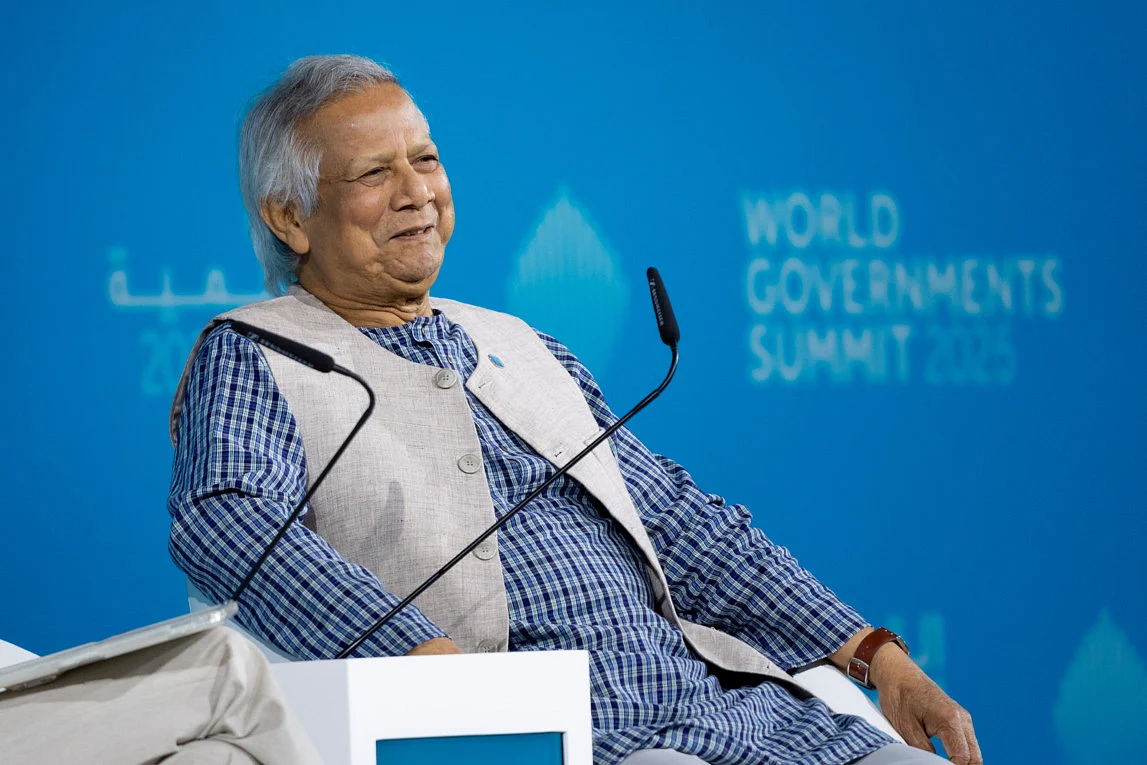WGS 2025: Bangladesh’s interim leader shares vision of rebuilding society
Muhammad Yunus vows to bring previous regime’s corrupted officials to justice

Dubai: During a high-profile session at the World Governments Summit 2025, Prof. Muhammad Yunus, Chief Advisor of Bangladesh’s caretaker government, engaged in a candid conversation with CNN’s Becky Anderson about the nation’s tumultuous political landscape and the significant work ahead in restoring stability.
Yunus, a Nobel Peace Prize laureate renowned for his pioneering efforts in microfinance, was called to action to help lead Bangladesh out of a period of intense turmoil since the ousting of Prime Minister Sheikh Hasina.
Yunus took the stage to discuss the heavy responsibility he now carries, a responsibility he never sought but accepted due to the country’s urgent needs. The session began with Anderson acknowledging the monumental political shifts in Bangladesh, a country at a critical crossroads, following years of unrest and governance challenges.
“No regret, but it is a big task.”
Reflecting on his role as Chief Advisor and asked by Andreson whether he regrets the role he took, Yunus said, “No regret, but it is a big task.”.
Though he was focused on advancing social business and microcredit globally, including his work on designing the Paris Olympic Games as a social business, he returned to Bangladesh when an emergency arose, and the country’s youth demanded his leadership.
“Students came up, offered their bodies, and said: shoot as many as you want of us but we are not going away. You [Sheikh Hasina] have to leave the country; you have to leave it to the people who deserve to be better.” Yunus shared how this powerful student movement forced the resignation of the former prime minister, paving the way for his involvement.
Yunus discussed the deep anger and distrust that permeates Bangladesh following the corruption and lack of democratic elections under former prime minister Sheikh Hasina’s regime.
The immediate priority for the caretaker government, he explained, was to establish law and order and ensure that the nation could prepare for free and fair elections, scheduled for late 2025 or early 2026.
Economy, and more
The situation is dire, with Bangladesh’s institutions in tatters and the economy on the brink of collapse. Yunus described the severity of the economic collapse, with $16 billion stolen from the banking system and billions more lost through fraudulent practices.
“The economy is at the verge of collapse. We have to rebuild those things. Our international reserve situation fell to the deepest point, so we need to rebuild that on the economic side,” Yunus stated, emphasising the necessity of rebuilding core institutions and the banking sector to restore public confidence.
Beyond the immediate economic and political tasks, Yunus emphasised the need for national reconciliation and justice.
Under his leadership, Bangladesh has started investigations into the human rights violations and forced disappearances committed during the prior regime. Yunus remains committed to holding accountable those responsible for the suffering and injustice, with the United Nations High Commissioner for Human Rights publishing a report confirming the abuses under Hasina’s rule.
New economic model
Turning to his broader vision for Bangladesh’s future, Yunus called for a new economic model focused on serving human needs rather than maximising profits. He reiterated his belief in the possibility of building a world without poverty, unemployment, or environmental degradation through social business — a concept that he has championed for decades.
“I am totally convinced it is possible because we wanted that. Since we wanted, we have to bring it out from us to make it happen,” Yunus remarked, stressing that businesses should address societal issues like healthcare, education, and technology without the sole purpose of generating profits.
As Yunus continues to oversee Bangladesh’s critical transition, he remains clear about his intentions. He will step down once elections are held and an elected government assumes power. “When my job is done, I will hand over the responsibility to the elected government and go back to what I enjoyed doing most,” he affirmed.
Immense challenges
The session highlighted the immense challenges Yunus faces as he leads Bangladesh toward a new chapter, with a focus on rebuilding institutions, restoring democracy, and tackling the economic crisis. His leadership continues to inspire those looking for transformative solutions to complex global problems, reinforcing his dedication to the ideals of social business and human-centred economic policies.
The WGS 2025, held under the theme ‘Shaping Future Governments’, convened over 30 heads of state and government, more than 80 international and regional organisations and 140 government delegations. Its agenda featured 21 global forums exploring major future trends and transformations, over 200 interactive sessions with more than 300 prominent speakers — including presidents, ministers, experts, thought leaders, and decision-makers — and over 30 ministerial meetings and roundtables attended by more than 400 ministers. The Summit also published 30 strategic reports in partnership with its international knowledge partners.
Sign up for the Daily Briefing
Get the latest news and updates straight to your inbox
Network Links
GN StoreDownload our app
© Al Nisr Publishing LLC 2025. All rights reserved.